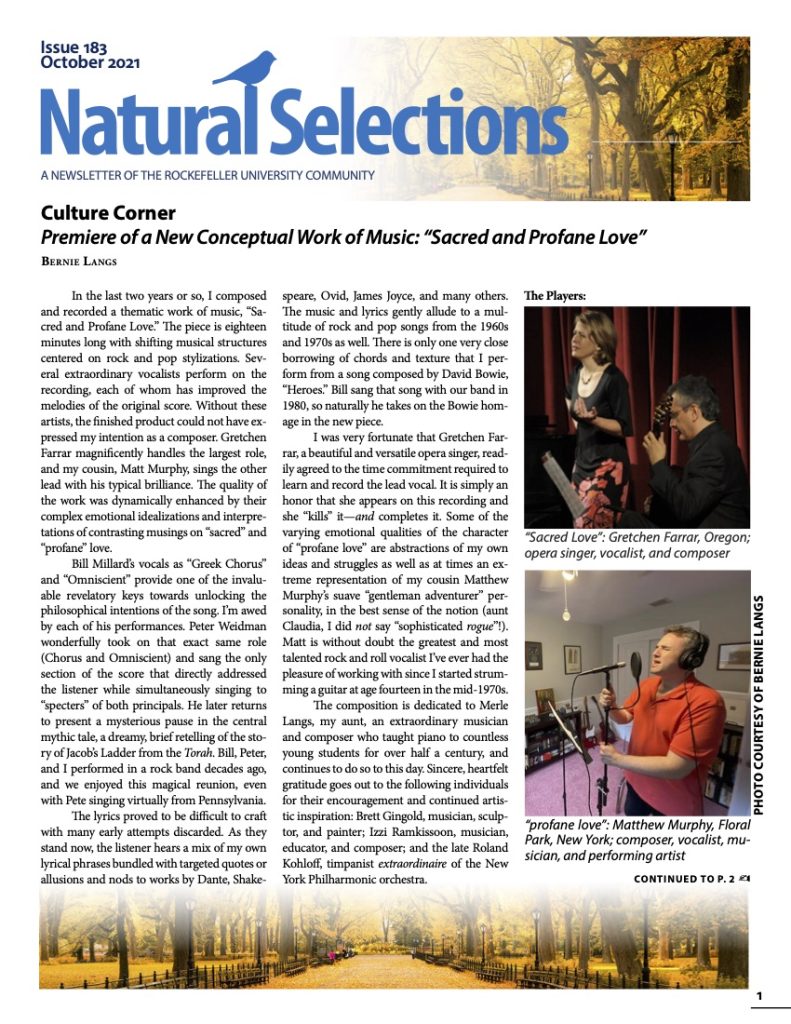By Bernie Lang
In the past couple of months, I’ve been to live concert performances in the major music genres of jazz, rock, and classical music. I found myself reflecting after each show on how these differing types of music are standing up within my own personal test of time.
My brother graced me with a ticket to see jazz saxophonist Joe Lovano play at the Village Vanguard. I hadn’t been to the fabulous Vanguard in many years, but remembered it as a small and intimate space for a performance. After I insisted that we sit in the back of the club, my brother immediately guided us to seats just one table away from the small stage. And I’m glad he did. Mr. Lovano played with a fantastic group, consisting of a piano player, a bassist and two drummers/percussionists. His saxophone playing was on a virtuoso level as he hovered above us, and the songs were exciting and exuded an extremely positive vibe. Mr. Lovano also showed off great and complex chops on the flute and clarinet, literally wowing the audience, who at the end gave a very warm ovation, which was gracefully and gratefully received by the band members. Mr. Lovano’s unique, complex, somewhat traditional sax melody lines, and his unwavering power and emotion on the ballads, will remain with me. I had written jazz off as a past interest, but this wonderful show rekindled my curiosity in this difficult form of music.
A few weeks later, I went to The Sands casino in Pennsylvania to watch the alternative rock band Weezer perform. The fact that I’d already been standing in the crowd for a couple of hours when Weezer hit the stage didn’t help my mood, which was also tempered by finding myself to be one of the older dudes at the show. I’d anticipated that, but thought it wouldn’t bother me. But it did. Weezer is led by Rivers Cuomo, an intriguing singer, guitarist, and songwriter who went to Harvard after being brought up in an ashram. With a kind of bookish look to him, he has always been celebrated as an outsider. I’m not the biggest fan of the group, but was pleased that the focus in the early stages of the concert was on an album I own, “The Green Album,” and songs such as “Hash Pipe” and the boppy “Island in the Sun” were great to hear. But it was all downhill for me from there. The volume of the music seemed to increase with each song and soon the sound was just the voice of Mr. Cuomo breaking through a distorted, cacophonous mush. I’ve been to plenty of loud concerts before—I have suffered a temporary and small loss of hearing, for example, after seeing Neil Young at Madison Square Garden—but the music had always come through in the past. I couldn’t see the point in just a steady barrage of guitars and drums. It wasn’t music. It wasn’t art.
The audience at the Weezer show sang along on these songs of the celebration of being the one who is different in society. I was reminded of the scene in the movie “Monty Python’s Life of Brian” where the would-be Messiah opens his bedroom window to find hundreds of his followers camped outside his house waiting for his words of wisdom. “You must think for yourself!” he implores them. They answer in unison, “We must think for ourselves!” Rock music will always remain closest to my heart and soul, since it is the music I compose and have given my whole life to. But a concert like this one, which began with promise and degenerated into what my father’s generation called “noise”, was terribly disappointing.
I was witness in November to the grand performance at Avery Fisher Hall of Mozart’s Requiem conducted by Bernard Labadie with the New York Philharmonic. I use the word “witness” to emphasize that this was an historic evening for me, because when I left the hall with the reverberation of the massive choir’s singing still ringing in my mind’s ear, I felt it was the very best live piece of music I’d ever heard live. Mozart died during the composition of the Requiem, and it was rounded out and finished by a pupil of his. The strong opening theme of haunting majesty and power, however, is Mozart’s. The four featured vocalists, Stephanie Blythe, Miah Persson, Frédéric Antoun and Andrew Foster-Williams, performed their solo portions with great style and nuance, and when they sang their harmonic lines together, they became a force of nature. But it was the choir, the New York Choral Artists, that kept me on the verge of the tears of appreciation of the ability of music to move celestial mountains, build bridges to heaven above, and take the soul soaring to previously unimagined heights. This may sound a little much and overblown, but I dare say it’s the truth – as I see it, of course!

